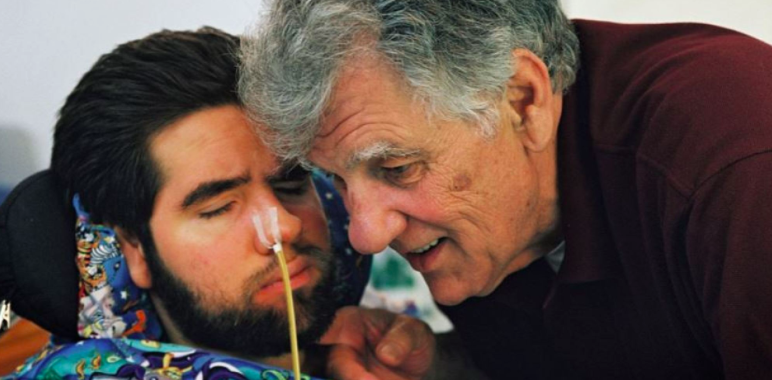
Translated by Claudio Peli
I met Augusto Odone in 2007. We were introduced by Ambassador Mario Alessio. Augusto was getting on in years and betrayed the weariness of a very unconventional life: a life devoted to fighting his son’s disease as well as the prejudices of the entire scientific community. He asked me to take over the running of the Italian Myelin Project Board (IMPB), a foundation he had set up a few years back. He felt too tired to run the Italian branch, but was determined to keep the project going. The aim is to find a way to restore the loss of the myelin covering surrounding nerve fibres, caused by inherited or acquired factors. Lorenzo, his son, was afflicted with a rare demyelinating disease, known as adrenoleukodystrophy.
Endowed with only a strong willpower and the love of his son, Augusto, formerly an economist for the World Bank with no medical background, set out to study medicine and biochemistry in a bid to understand his son’s pathology that no doctor had yet been able to deal with. Within a few years, he managed to discover that the cause of cerebral damage was long-chain fatty acid accumulation. The cause was genetic: some of the enzymes responsible for degrading these substances did not work. Moreover, after making an inspired guess, he discovered that the enzymes responsible for this pathology could be made to work properly by administering oleic acid.
Following these unexpected developments, with the help of scientists and industrialists, Augusto hit upon a therapy involving the use of euricic and oleic acid (isolated from rapeseed oil and olive oil respectively) which came to be known as Lorenzo’s oil. This oil succeeded in halting the progression of the disease or significantly slowing it down. Unfortunately though, at that point, Lorenzo’s vital functions had been irreparably compromised and with limited levels of consciousness, but the therapy did prove successful for thousands of children suffering from the same disease, adrenoleukodystrophy.
Odone’s challenge might seem impossible today. As he himself told me, ‘My stance defies any market law’. As a former economist, he knew the difficulties in raising money to develop medicinal molecules which would not generate enough profits to cover research and production costs. There didn’t seem any point in trying to involve pharmaceutical companies, the only ones that were actually able to turn an idea into administrable medications. This is why Lorenzo and Augusto’s story was dramatized in the famous Hollywood movie, Lorenzo’s oil (1992) starring Susan Sarandon and Nick Nolte. “Sadly, our family will go down in history.” Augusto used to say. His wife, Michaela Teresa Murphy Odone, died of cancer in 2000. Lorenzo’s earthly existence came to an end in a quasi-vegetative state brought on by pulmonary complications. It was 2008, on his 30th birthday and not at the age of eight as the doctors from back then had claimed. Augusto, who was born in Rome on March 6th, 1933 and grew up in Gamalero, a village in the vicinity of Acqui Terme in the Italian region of Piedmont, can now embrace them again. But, more importantly, he can run with his son, like he used to when Lorenzo was five years old.
There are countless rare diseases, like the one Lorenzo was afflicted with, and the search for a cure requires an enormous amount of financial, human and intellectual resources. The parents of children suffering from a rare disease have to be endowed with steely determination, sensitivity and intelligence. These are just some of the qualities that characterized Augusto’s life, qualities which seem to have disappeared today, as a result of chronic lack of funding. And it is precisely this lack of funds that makes all the difference: certain drugs only exist ‘on paper’ and never make it to the market because of the staggering production costs that any profits earned after marketing the products would fail to cover.
However, there are also diagnostic limits, lack of information and red tape in healthcare to be confronted with. We propose to jump over these hurdles through the ongoing research activities of our Work Group as well as with this special issue of our magazine dedicated to rare diseases. We cherish the hope that many families will come out into the open and tell their stories, thus acquiring the amazing vital force of this great man: Augusto Odone.
By Massimiliano Fanni Canelles
Chairman of the Italian Myelin Project Board






